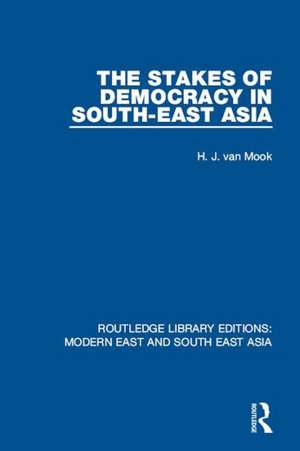The Stakes of Democracy in South-East Asia: Routledge Library Editions: Modern East and South East Asia
Autor H. van Mooken Limba Engleză Hardback – 15 apr 2015
Preț: 823.17 lei
Preț vechi: 1241.31 lei
-34% Nou
Puncte Express: 1235
Preț estimativ în valută:
157.52€ • 168.44$ • 131.33£
157.52€ • 168.44$ • 131.33£
Carte tipărită la comandă
Livrare economică 18 aprilie-02 mai
Preluare comenzi: 021 569.72.76
Specificații
ISBN-13: 9781138901483
ISBN-10: 1138901482
Pagini: 314
Dimensiuni: 156 x 234 mm
Greutate: 0.64 kg
Ediția:1
Editura: Taylor & Francis
Colecția Routledge
Seria Routledge Library Editions: Modern East and South East Asia
Locul publicării:Oxford, United Kingdom
ISBN-10: 1138901482
Pagini: 314
Dimensiuni: 156 x 234 mm
Greutate: 0.64 kg
Ediția:1
Editura: Taylor & Francis
Colecția Routledge
Seria Routledge Library Editions: Modern East and South East Asia
Locul publicării:Oxford, United Kingdom
Public țintă
Postgraduate and UndergraduateCuprins
1. The Foundations of South East Asia 1.1. The Origins of South East Asia 1.2. Invasion from the West 1.3. Imperialism at the Flood 1.4. The Birth of Nationalism in South East Asia 1.5. Two Colonial Cases 2. War and Revolution 2.1. Invasion from the North 2.2. Transient Empire 2.3. An Unforeseen Peace 2.4. The Nationalist Revolt 3. The Future of South East Asia 3.1. United Nations and Divided Counsels 3.2. The Bad Conscience of the West 3.3. The Economic Mainspring 3.4. Capitalist Adventurers and Communist Agitators 3.5. Voluntary Association in South East Asia
Descriere
Will national independence bring to the peoples of South East Asia liberty and democracy? Or will it mean corrupt government, factional strife and insolvency? Or will it mean eventual absorption by totalitarian communism? In this book, first published in 1950, the author analyses these questions, using the case history of Indonesia since 1940, in which he played a leading role, to illustrate his points. He gives an outline of the history of South East Asia, its domination by the West and its convulsion by war and nationalism. The seven nations of South East Asia – Ceylon, Burma, Siam, Indo-China, Malaya, Indonesia and the Philippines – have a great deal in common: except for Siam, they are all struggling through the formative years of nationhood; except for Ceylon, they were all occupied and pillaged by Japan during the War. They are of great value to other nations as a source of raw materials and foodstuffs. Their political and economic structure is of vital importance, both to themselves and to us and unless their new nationalism can be strengthened, the free world may lose a valuable asset to its economy and an ally against totalitarianism in Asia.






